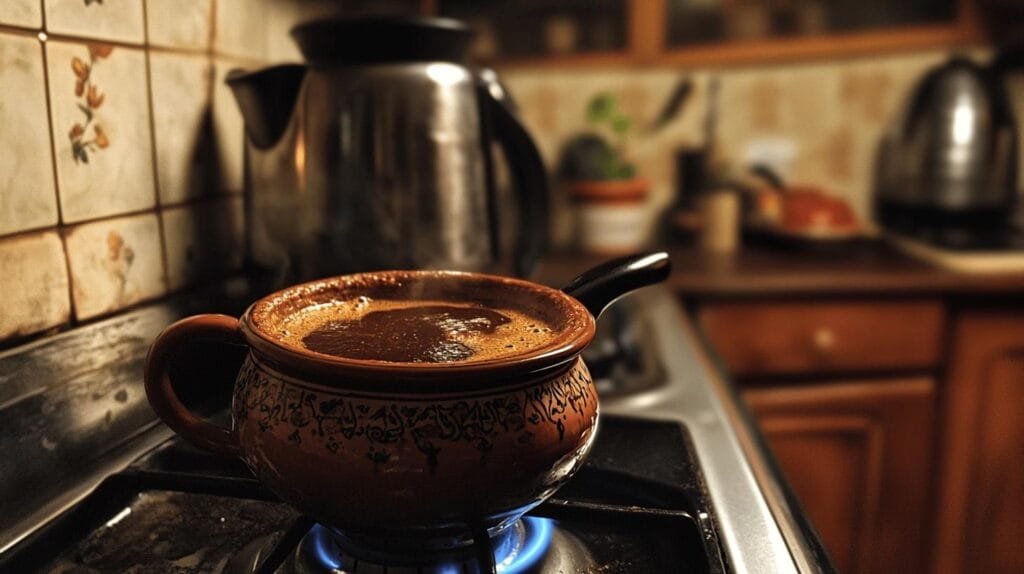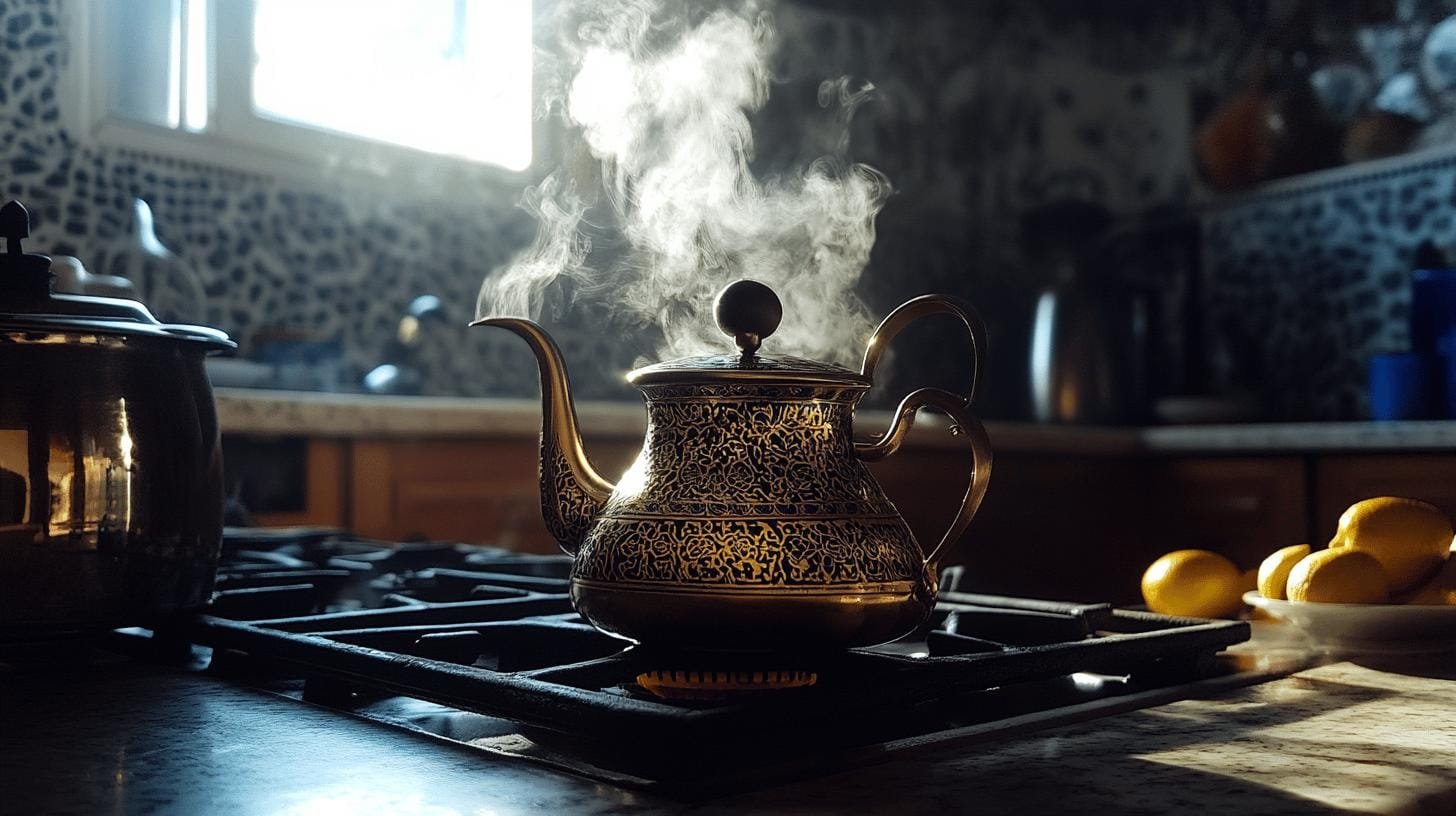
Artisanal Rituals for a Memorable Customer Experience
How can brands create a more balanced and memorable customer experience by blending artisanal product quality with thoughtful everyday rituals that keep people coming back?

Is Turkish coffee stronger than regular coffee, or is its reputation simply a robust myth? This intriguing question stirs up passionate debates among coffee aficionados who prize both flavor and caffeine kick. With Turkish coffee’s rich history and unique preparation methods, does it hold an advantage over the typical drip or pour-over brew in terms of strength? Let’s find out.
Turkish coffee is often seen as stronger than regular coffee. This strength comes from how it’s made and its concentration. The caffeine content in Turkish coffee ranges from 40 to 65 mg in a two to five-ounce serving. This is due to the unfiltered brewing method, which keeps more caffeine in the cup, unlike filtered brewing methods.
The caffeine content is usually measured through chemical analysis to ensure precise levels in each serving.
The preparation method of Turkish coffee plays a significant role in its strength and flavor. Coffee is boiled with water in a pot called a cezve, which allows it to froth. With no filtering, the grounds stay in the cup, making the coffee thick and intense. This gives it a rich flavor, setting it apart from milder regular coffee.

Is Turkish coffee stronger than regular coffee? Typically, yes. It’s stronger due to its brewing method and lack of filtration. Finely ground coffee is boiled in a cezve, with all coffee particles remaining in the cup. This results in a richer brew with more coffee oils and solids, enhancing flavor and intensity. Regular coffee uses drip or pour-over techniques, which filter out particles. This gives it a lighter flavor and lower caffeine concentration.
Strength in coffee isn’t just about caffeine. It’s about flavor and texture, too. Turkish coffee’s bold taste and creamy texture come from the grounds left in the cup. This unfiltered method makes the taste stronger. Regular coffee tends to be milder, appealing to those who like less intense flavor.
Turkish coffee is usually served in small cups—two to five ounces—concentrating its strength. Regular coffee is often in larger cups, which dilutes its intensity. The combination of brewing method, serving size, and retained grounds makes Turkish coffee a stronger option.
| Coffee Type | Brewing Method | Caffeine Content (mg) | Flavor Profile |
|---|---|---|---|
| Turkish Coffee | Boiled in cezve | 50-65 | Bold, intense, creamy |
| Regular Coffee | Drip/Pour over | 95-165 | Mild, clean, light |
Is Turkish coffee stronger than regular coffee? Yes, and it’s largely due to its brewing technique. The process mixes finely ground coffee with water and sometimes sugar in a cezve. It’s heated until it froths, without filtering, leaving grounds in the cup. This makes the brew dense with a bold flavor and creamy texture.
Regular coffee often uses drip or pour-over methods. This gives a milder brew with less caffeine and flavor, making it softer compared to Turkish coffee.
Different brewing methods can change a coffee’s strength and flavor. For example:
These methods highlight how coffee strength can vary, with Turkish coffee standing out due to its unfiltered preparation.

Turkish coffee is known for its intense flavor, thanks to its unique preparation. Finely ground beans brewed without filtering enhance aroma and flavor, often resulting in a creamy, full-bodied taste. Adding sugar during brewing can balance its bitterness, creating a distinctive flavor from regular coffee.
Its flavor profile is tied to cultural traditions dating back centuries. Originating from Turkish coffee culture, it’s made with a cezve, symbolizing hospitality and tradition. The intense flavor isn’t only from the beans but also from the careful brewing process passed down through generations.
Turkish coffee is central to social gatherings, fostering connection. It’s served in small cups, often with water or a sweet treat like Turkish delight. This ritual reflects its role in Turkish customs, used to welcome guests.
Preparing and serving Turkish coffee is significant and ceremonial, showcasing precision and care. The coffee grounds left in the cup are sometimes used for fortune-telling, adding mystique to the experience. Beyond flavor, Turkish coffee’s cultural significance is rich in history and shared moments.
How can you brew strong Turkish coffee at home? Start with high-quality, home-roasted beans. Roasted at home, these beans are fresher and more flavorful. This freshness enhances the brew’s strength and taste. A medium to dark roast gives the boldness typical of Turkish coffee.
Why are grind size and water temperature important? The grind should be fine, like powdered sugar, for optimal flavor extraction. Incorrect grind size can result in bitter or weak coffee. The water should be heated slowly to just below boiling to get rich flavors and quality foam, known as “kaimaki.” This foam shows proper technique and boosts the taste experience.
So, is Turkish coffee stronger than regular coffee? The answer lies in your home brewing method and personal preference.
In reviewing the coffee-strength dynamics, Turkish coffee emerges with pronounced boldness, shaped by its caffeine concentration and unique brewing processes. Factors such as bean type and preparation intricacies distinguish it from regular coffee.
Comparatively, Turkish coffee often surpasses regular varieties in robustness, enhanced by its rich, immersive flavors and storied cultural rituals.
Recognizing that Turkish coffee offers a potent and flavorful experience answers the query: Is Turkish coffee stronger than regular coffee? Indeed, it is an invitation to savor each cup thoughtfully.
Turkish coffee is stronger than regular coffee due to its bold, intense flavor and thicker texture. The unique brewing method enhances its strength compared to milder-flavored regular coffee.
Turkish coffee and espresso both have strong flavors, but Turkish coffee often has a thicker texture and slightly lower caffeine content than espresso.
Turkish coffee is considered healthy, as it contains beneficial antioxidants. However, moderation is key since high consumption could lead to caffeine-related issues.
Turkish coffee is made by mixing fine coffee grounds with water and sugar, then heating until frothy. This method provides a strong, robust flavor.
Potential disadvantages include high caffeine content possibly causing jitteriness if consumed in large amounts and sediment in the cup, which might not appeal to everyone.
Turkish coffee contains moderate caffeine levels, typically ranging from 50 to 65 mg per serving, influenced by grind size and preparation method.

How can brands create a more balanced and memorable customer experience by blending artisanal product quality with thoughtful everyday rituals that keep people coming back?

Independent coffee shops have always been about more than caffeine—they’re hubs of creativity, connection, and care. As café culture continues to evolve, new trends are

Introduction Independent cafes win when they feel like the neighborhood’s living room and operate with the discipline of a great kitchen. Below is a quick

Discover how top specialty coffee brands create lasting loyalty through storytelling, sourcing, and community connection. Real tips from 6 industry experts.

Discover the ultimate showdown between two beloved coffee brewing methods: the French press and Chemex. Explore how each technique caters to distinct palates, with the French press delivering bold flavors and the Chemex presenting a bright, clean taste.

Unlock the secrets to brewing the perfect cup of coffee with our comprehensive guide on using a coffee scale. Discover how precise measurements enhance flavor and consistency while eliminating bitterness.

Discover how water temperature plays a vital role in brewing the perfect cup of coffee. This article delves into the ideal temperature range of 195°F to 205°F for optimal flavor extraction, enhancing the enjoyment of high-quality beans.

Discover the world of curated specialty coffee bundles, perfect for enthusiasts seeking quality and craftsmanship. This article explores the benefits of ethically sourced, small-batch beans from brands like Equipoise Coffee, offering diverse flavor profiles that elevate your brewing experience.

Discover the art of manual brewing to elevate your coffee experience! This article explores various techniques like pour-over, French press, and AeroPress, revealing how they enhance flavor and your connection to every cup.